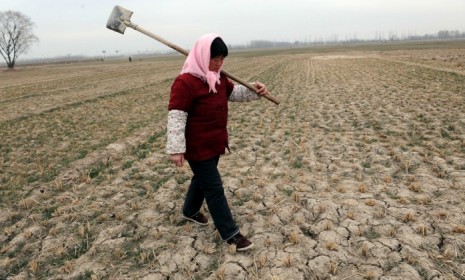Could China's drought raise your grocery bill?
How a lack of rain in the Far East may translate into a pricier box of Wheaties in your shopping cart

A free daily email with the biggest news stories of the day – and the best features from TheWeek.com
You are now subscribed
Your newsletter sign-up was successful
China, the world's biggest producer and consumer of wheat, is facing a historic drought that could impact the price of everyday foods around the world. This week, the United Nations' Food and Agriculture Organization called the drought a potentially "serious problem," and observers say it could affect the affordability of staples like rice and noodles. How worrisome is China's wheat shortage? Here, a brief guide:
How dry is it?
The wheat belt of Northern China has had barely any rain since October, and is experiencing its most severe drought in 60 years. One province is suffering through its driest spell in 200 years. China's key wheat-producing regions — an area larger than Denmark — have lost 42 percent of the wheat they had planted. The lack of rain has also led to a drinking-water shortage for 2.7 million residents. (Watch an AP report about the drought)
The Week
Escape your echo chamber. Get the facts behind the news, plus analysis from multiple perspectives.

Sign up for The Week's Free Newsletters
From our morning news briefing to a weekly Good News Newsletter, get the best of The Week delivered directly to your inbox.
From our morning news briefing to a weekly Good News Newsletter, get the best of The Week delivered directly to your inbox.
Can China buy its way out?
The state news agency Xinhua reports that the Chinese government is spending more than $1 billion to divert water to the affected areas, as well as to build wells and irrigation facilities. The government is also increasing the minimum purchase prices for grain and "subsidizing the purchase of anti-drought technologies."
Can't China just make it rain?
China has tried seeding clouds with rain, a technique that gained prominence with the 2008 Beijing Olympics. "Cloud-seeding has achieved a good result and played an active role in relieving the drought situation," says the deputy director of a Chinese weather bureau, as quoted by Xinhua. Still, state officials warn that without traditional rainfall, the drought could last into April.
A free daily email with the biggest news stories of the day – and the best features from TheWeek.com
Why are prices climbing?
This week, wheat prices soared to a 29-month high on the global benchmark Chicago Mercantile Exchange. It's not just the wheat shortage created by China's drought — dry spells in Canada, Kazakhstan and Russia, and floods in Australia have also contributed. Another big factor is global instability; Egypt is the world's number one importer of wheat. Buyers are snatching up wheat while they still can, which has led to a potentially dangerous gap between supply and demand. "Whenever you get the market as tight as we are now, hoarding becomes widespread," says Abdolreza Abbassian, as quoted by Bloomberg.
How will your grocery bill be affected?
In Chinese cities, reports Rob Schmitz at NPR, noodle shops are adjusting menus to reflect rapidly increasing prices for "anything made with wheat." It may only be a matter of time before such effects are felt elsewhere, and "that means that everything from bread to a box of — yes — Wheaties will cost more to make, and likely more to buy."
Should we panic?
Not quite yet. Chinese officials say there's still plenty of time for wheat-producing regions to get the rain they need to salvage this season. And with more rain still a possibility, says Josh Noble in The Financial Times, "China isn't suffering from wheat shock just yet."
Sources: Financial Times, ABC News, Xinhua, AFP, NPR, Bloomberg (2), New York Times, The Nation
-
 Local elections 2026: where are they and who is expected to win?
Local elections 2026: where are they and who is expected to win?The Explainer Labour is braced for heavy losses and U-turn on postponing some council elections hasn’t helped the party’s prospects
-
 6 of the world’s most accessible destinations
6 of the world’s most accessible destinationsThe Week Recommends Experience all of Berlin, Singapore and Sydney
-
 How the FCC’s ‘equal time’ rule works
How the FCC’s ‘equal time’ rule worksIn the Spotlight The law is at the heart of the Colbert-CBS conflict